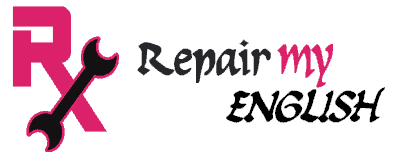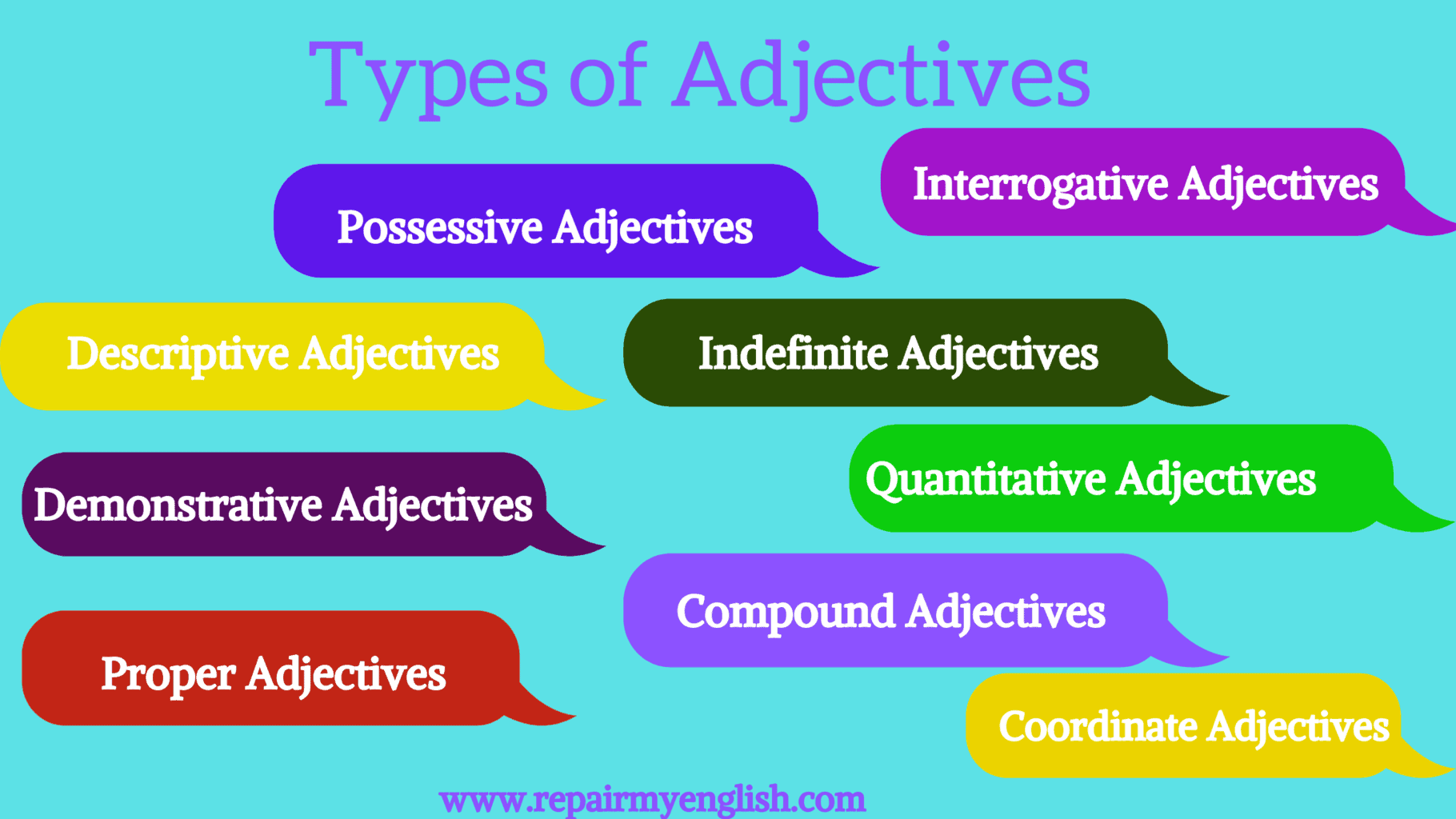This blog is about definition of Adjectives, Type of Adjectives with example sentences. Generally, second language learners get confused between adjectives and adverbs. So, in this blog, you will learn what adjectives are? What are different types of adjectives? What are the Positive, Comparative and Superlative degrees of adjectives? And, what are Irregular Adjectives with example sentences?
Definition of Adjectives:
Adjectives are crucial words that characterize nouns and pronouns. In other words, adjectives describe the quality of a noun or pronoun. Besides, adjectives can also modify adverbs.
Adjectives example sentences:
- Reena looked beautiful in a black dress.
- Mona is a brilliant girl.
- Prerna lives in a big bungalow.
- Mike is an incredible orator.
- Jack delivered a thought-provoking lecture.
Types of Adjectives:
- Possessive Adjectives
- Descriptive Adjectives
- Demonstrative Adjectives
- Proper Adjectives
- Interrogative Adjectives
- Indefinite Adjectives
- Quantitative Adjectives
- Compound Adjectives
- Coordinate Adjectives
1) Possessive Adjectives:
Possessive Adjectives are like pronouns that come before nouns. They clarify who owns what. Examples of possessive adjectives:
His, her, our, and my
Example:
He lost his luggage at the airport.
“His” is a possessive adjective in this sentence.
Possessive Adjectives Examples :
- She is concerned about her exam.
- The students have not submitted their answer sheets yet.
- He cannot believe that you broke her window.
- His thoughts are very innovative.
- Her stepmother made her life miserable.
2) Descriptive Adjectives:
Descriptive Adjectives are words that describe a noun’s features. These adjectives indicate the size, colour, shape, taste, and other characteristics of a term.
Purple
Large
Witty
Salty
Example:
Sehaj works in a modern and luxurious building.
In this sentence, “modern” and “luxurious” are the two adjectives.
Descriptive Adjectives Examples :
- I threw a surprise party on my niece’s birthday.
- Her husband bought a diamond ring on their wedding anniversary.
- Rohit sends his girlfriend beautiful red roses on Valentine’s day.
- Children don’t like to eat green leafy vegetables.
- Her brother bought an expensive bike this year.
3) Demonstrative Adjectives:
Demonstrative adjectives point out specific nouns. Some demonstrative adjectives include:
This
That
These
Those
Example:
He sold that house.
In this sentence, “that” is used as a demonstrative adjective.
Demonstrative Adjectives Examples:
- These apples are fresh.
- I want to buy that beautiful ring.
- She couldn’t forget those embarrassing moments of her life.
- This skirt is very uncomfortable.
- Did you re-decorate this room?
4) Proper Adjectives:
Proper adjectives describe people, places, and things, and that’s why they must be capitalized. For example, Victoria is the queen’s name, beginning with a capital letter; therefore, Victoria’s adjective (Victorian) must also start with a capital letter.
Proper Adjectives Examples:
- Her sister likes Italian food.
- Arundhathi Roy is an Indian Author.
- Rohit is currently studying in a Catholic school.
- Mexican people are very welcoming.
- Korean food is getting popular these days.
5) Interrogative Adjectives:
Interrogative adjectives are used in interrogative sentences to modify nouns. Interrogative adjectives include:
What
Which
Whose
Which
E.g. Which vegetable do you like the most?
In this sentence, “which” is used as an interrogative adjective
Interrogative Adjectives Examples:
- Which room did you book for your stay in this hotel?
- What dessert will you make for the guest?
- What product did you purchase from Flipkart?
- Whose clothes will you wear for the party?
- Which movie are you watching now?
6) Indefinite Adjectives:
Indefinite adjectives describe a noun in a general fashion. They provide some but not complete information.
Examples:
Much
Most
A few
A few people travelled to foreign countries for vacation. The indefinite adjective “A few” is used to describe people. It isn’t clear how many people travelled to foreign countries.
Indefinite Adjectives Examples:
- Several relatives attended our wedding function.
- I kept some plums in the fridge.
- Many outlets were closed during curfew.
- I received only a few benefits from the company when I joined the job.
- Some people are very mean to others.
7) Quantitative Adjectives:
A quantitative adjective indicates the quantity of nouns/pronouns. This type of inquiry falls under the ‘how much’ and ‘how many’ question categories.
Quantitative Adjectives Examples:
- Two students from our school got selected in the final round.
- Not a single person attended the felicitation ceremony.
- My brother ate half of my sandwich.
- There isn’t enough water in the bottle.
- I don’t have sufficient money in my savings account.
8) Compound adjectives:
A compound adjective comprises two or more words. Hyphens are frequently used to connect them, especially if they come before the noun; however, this isn’t always the case—full-time, five-hour, and open-minded.
Compound Adjectives Examples:
- The felicitation ceremony was well-organized.
- Indian snack “pani-puri” is mouth-watering.
- My friends are not self-centred.
- I can’t wear this dress at the function as it got old-fashioned.
- I want to invite you to the house-warming ceremony.
9) Coordinate adjectives:
Multiple adjectives that modify the same word and are equal in rank are called Coordinate adjectives.
To separate coordinate adjectives, you should use a comma or the word “and”.
Coordinate Adjectives Examples:
- Reena is a bright and intelligent woman.
- I love to live in a luxurious, big bungalow.
- The dark red, beautiful rose flower smells very good.
- You are a very cruel, heartless, and mean person.
- At dinner, we ate delicious, oversized vegetable pizza.
Adjectives have 3 degrees in total. They are the positive degree of adjectives, comparative degree of adjectives and superlative degree of adjectives. Now, let us learn the degree of adjectives in detail.
Degree of adjectives:
3 Degrees of Adjectives:
Positive degree: Mukesh is a generous person.
Comparative degree: Mukesh is more generous than Mohit.
Superlative degree: Mukesh is the most generous person in our community.
Positive, Comparative, and Superlative:
A positive adjective is an adjective that describes rather than compares. For example:
- That was a delicious cake.
- She is a generous woman.
- Mohit is tall.
- We saw an enormous building on the way.
- Reena is intelligent.
A comparative adjective compares two things and follows the word “than” or “to.” For example:
- Pizza is better than that sandwich.
- Mohit is taller than Mukesh.
- Reena is more intelligent than Neha.
- Neha is more generous than Reena.
- This pizza is more delicious than pasta.
The superlative adjective is used to compare three or more things. For example:
- This is the most beautiful memory of my grandmother.
- Samsung is the best mobile phone that I have ever used.
- Reena is the most intelligent girl in the class.
- Neha is the most generous woman in our community.
- Mohit is the tallest student in the class.
Forming regular comparatives and superlatives:
It’s simple to form a comparative and superlative degree of adjectives. The number of syllables in the adjective determines the form.
One syllable adjectives:
If the adjective comprises only one vowel sound, we should use –er for the comparative degree or –est for the superlative degree.
| Positive | Comparative | Superlative |
| small | smaller | smallest |
| high | higher | highest |
| fast | faster | fastest |
| big | bigger | biggest |
| long | longer | longest |
Two syllables:
Adjectives comprising two vowel sounds can be changed in a comparative degree by adding-er or adding –more. Similarly, the superlative degree of the adjective can also be formed by adding –est or by adding –most. But, the adjectives that end in “y” as in the word “busy” can be changed into “–ier” and “–ist” in the comparative and the superlative degree.
Busy – Busier- Busiest
| Adjective | Comparative | Superlative |
| Costly | Costlier | Costliest |
| Wise | Wiser | Wisest |
| Safe | Safer | Safest |
| Happy | Happier | Happiest |
| Large | Larger | Largest |
Three or more syllables
When the adjective comprises three or more syllables, the comparative degree is formed by adding “-more.” The superlative degree is formed by adding “–most” in front of the adjective.
| Adjective | Comparative | Superlative |
| Industrious | More industrious | Most industrious |
| Dexterous | More dexterous | Most dexterous |
| attractive | More attractive | Most attractive |
| ambitious | More ambitious | Most ambitious |
| Faithful | More Faithful | Most Faithful |
Irregular Adjectives: Comparatives and Superlatives:
Irregular adjectives are those adjectives that don’t change their forms like regular adjectives. The best example is bad-worse-worst.
However, certain adjectives have irregular comparative and superlative forms; examples are as follows:
| Positive | Comparative | Superlative |
| Many | more | most |
| Much | more | most |
| Far | further | furthest |
| Far | farther | farthest |
| Little | less | least |
| Good | better | best |
| Bad | worse | worst |
- It is the least expected answer to this question.
- Reena is a better student than Mohit.
- That was the worst experience of my life.
- The blue car is less expensive than the white car.
- The teacher will discuss the same topic further in the next class.
Learn More:

